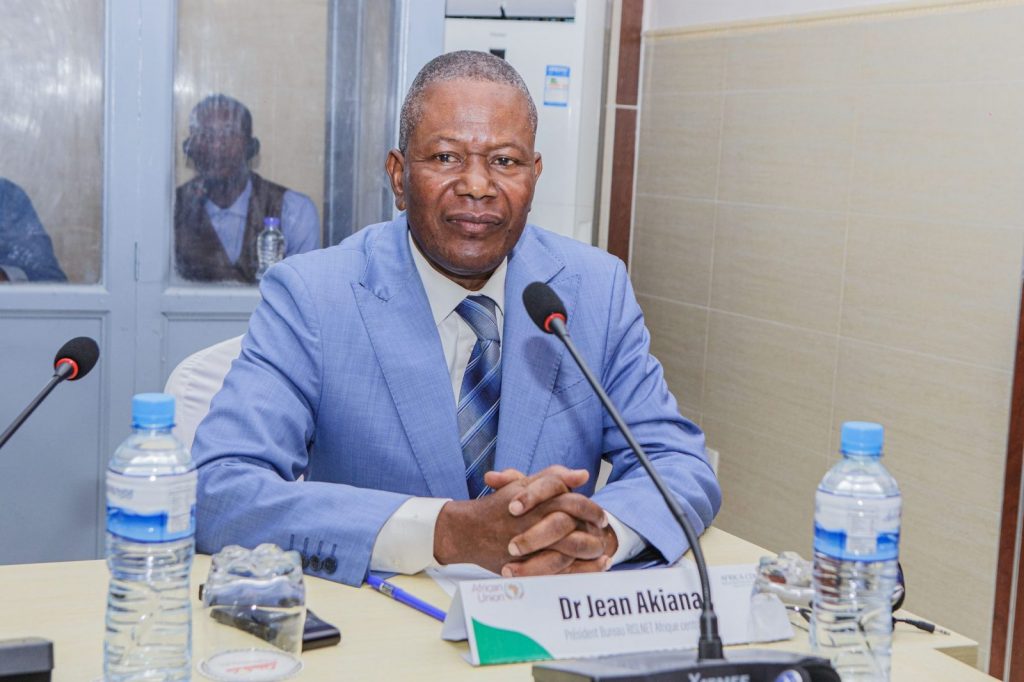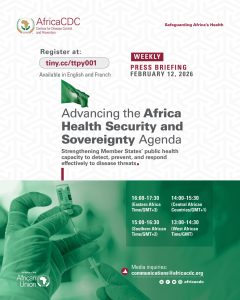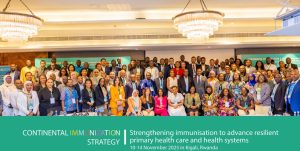The Regional Integrated Surveillance and Laboratory Network (RISLNET) was established by the Africa Centres for Disease Control and Prevention (Africa CDC) to coordinate and integrate all public health laboratory, surveillance and emergency response assets, including public health data, to effectively support prevention, rapid detection and response to current and emerging public health threats within defined geographic regions of Africa. Africa CDC interviewed the RISLNET Coordinator in the Central Africa region.
- What is the history of RISLNET in the Central Africa region
The Regional Integrated Surveillance and Laboratory Network (RISLNET) Programme in the Central Africa region was established in November 2018 in Brazzaville, Republic of Congo. The RISLNET Bureau was constituted and commissioned into office in February 2019, as follows: Presidency (Republic of Congo), Vice-Presidency (Republic of Cameroon), Secretariat General (Republic of Gabon); Deputy Secretariat General (Republic of Burundi). The RISLNET was incepted at a time when the Central African region was facing a series of outbreaks, notably the Ebola Virus outbreak that started in the Democratic Republic of the Congo, alongside other epidemics like cholera and chikungunya fever etc.
- How does the RISLNET programme contribute to strengthening the health systems of the Member States in Central Africa
The Regional Integrated Surveillance and Laboratory Network is an excellent opportunity for the Central Africa region. It fosters a collaborative environment for sharing laboratory and disease surveillance practices. This collaborative approach allows Member States and technical Experts to exchange information and learn from one another, ultimately serving as a powerful tool for strengthening laboratory systems’ capabilities.
- To what extent has RISLNET achieved its objective of enhancing the rapid detection and response to disease outbreaks in the Central Africa region?
RISLNET has made substantial progress in achieving its core objective of facilitating rapid detection, investigation, effective response, and control of disease outbreaks in the Central Africa region. This goal has been significantly advanced by sharing comprehensive epidemiological surveillance data while considering detection capabilities. RISLNET serves as a genuine community of practice, fostering synergies and enabling the pooling of technical resources among network laboratories. It functions as a forum for exchanging technical capabilities, thereby contributing to the rapid and effective management of disease outbreaks.
- How has the Africa CDC supported establishing and strengthening laboratory systems in Central Africa through the RISLNET platform?
Through its mandate, Africa CDC has played a crucial role in establishing and enhancing laboratory systems across Central Africa through the RISLNET platform. This has been accomplished through organizing regional meetings, focusing on addressing the challenges posed by the COVID-19 pandemic. Leveraging existing expertise within the RISLNET network, technical assistance has been extended from countries with better capacity to those in need within the Central African RISLNET area, facilitated by Africa CDC. Moreover, RISLNET coordinators, with the backing of Africa CDC’s Central Africa Regional Coordination Centre, have curated a comprehensive directory of experts in the region across various domains contributing to the surveillance, detection, and control of epidemics.
- How is RISLNET leveraging laboratory capacity and assets of partner networks to improve public health across Central Africa?
RISLNET is strategically harnessing laboratory capacity and assets from partner networks to advance public health across Central Africa. This is achieved through the establishment and reinforcement of national laboratory networks. Furthermore, it emphasizes the critical importance of enhancing multidisciplinary and multisectoral collaboration, fostering coordination within and among national networks encompassing the entire RISLNET region. An additional focus is placed on digitization of national laboratory networks, enabling rapid access to epidemiological data at the national level. This facilitates seamless sharing of essential information when needed while ensuring the security of each country’s non-official data.
- Can you share key milestones and best practices from implementing RISLNET in Central Africa that could benefit other regional networks?
The various stages and possible best practices may include the following:
- Establishment of a dedicated laboratory department in each RISLNET Member State, aligning with the “Maputo Declaration of 22 January 2008.”
- Setting up of Laboratories Information Systems (LIS) in each RISLNET country.
- Adoption or revision of policies, development of budgeted strategic plans, formulation of quality standards, and creation of transport manuals for biological samples, with the collaborative sharing of these resources within the RISLNET network.
- Setting up and strengthening “ONE HEALTH” platforms in each country,
- What steps can be taken to optimize RISLNET efforts and enhance laboratory capacities and workforce in the region?
To optimize RISLNET efforts and elevate laboratory capacities and workforce in the region, the following essential steps must be taken urgently:
- Expedite the finalization of RISLNET’s statutes and internal regulations while continuing with the process of having member countries replace their representatives in the Bureau.
- Promote comprehensive training initiatives for laboratory and public health professionals across the region, ensuring the development of skilled experts.
- Extend robust support for quality assurance processes within RISLNET laboratories to enhance their capabilities and achieve accreditation.
- Establish centres of excellence dedicated to training in the field of epidemiology, particularly in the context of emergency health situations.
- Organize national networks for the secure transportation of biological samples, possessing the capacity to ensure their safe transfer even beyond the confines of the RISLNET area.
- Create favourable conditions for RISLNET, facilitated through the Central Africa RCC, to mobilize financial support from partners by establishing sustainable and viable projects.
- How do you foresee the future of the RISLNET programme as it extends to more Member States and regions in Africa?
We envision the future of the RISLNET programme to necessitate strategic considerations to expand it to encompass more Member States and regions in Africa. To achieve this, a rotational model for RISLNET meetings is recommended, enabling authorities from all countries to become acquainted with the program. Additionally, fostering accountability within the RISLNET Bureau is vital, with a regular rotation of individuals holding key positions. Furthermore, securing funding for RISLNET is imperative to facilitate the Bureau’s activities and empower each member to fulfil their roles and responsibilities effectively.
Media inquiries:
Dorothy Wambeti Njagi, Senior Communication Officer – Policy, Health Diplomacy & Communication: Africa CDC | Tel: +251 940 559 950 | Email: njagid@africa-union.org
G. Nekerwon Gweh, Communication Officer – Policy, Health Diplomacy & Communication; Africa CDC | Tel: +251 945 502 310 | Email: GwehN@africa-union.org







